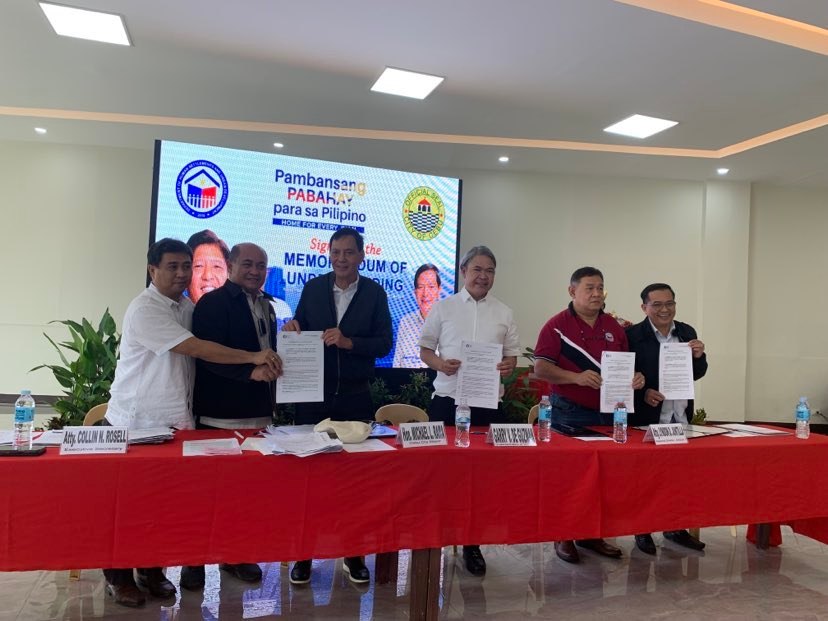MOU inked for building 30,000 housing units for Cebu City residents

Cebu City government officials led by Mayor Michael Rama signs the memorandum of understanding for housing program with DHSUD officials led by Usec. Garry de Guzman, at the Cebu City Hall on Friday, November 18, 2022.| Wenilyn B. Sabalo
CEBU CITY, Philippines — Informal settler families (ISF) in Cebu City will soon have the opportunity to own a house, as the city government signed a memorandum of understanding (MOU) with the Department of Human Settlements and Urban Development (DHSUD) for affordable housing, on Friday, Nov. 18, 2022.
The MOU covers the agreement between the city government and the DHSUD to undertake 30,000 housing units for Cebu City under the DHSUD’s “Pambansang Pabahay Para sa Pilipino: Zero ISF Program for 2028.”
This national program targets to build one million housing units per year or a total of six million housing units for six years.
In Cebu City, the priority beneficiaries for the program are families affected by the city’s recovery of the three-meter easement program, other clearing operations, minimum wage earners, and government employees who do not have their own houses.
Under the MOU, Cebu City will commit to allocate to DHSUD a parcel of its land for the housing project. Cebu City is also in charge of the beneficiaries identification. The process will include social preparation, ISF census enumeration, and socioeconomic profiling, among others.
Lawyer Collin Rosell, executive secretary to the mayor, said the next move that the city would undertake after the signing of the MOU would be the inventory of its properties to identify the location or locations of this housing project.
Among the areas considered are Barangays Lorega, Kamagayan and the South Road Properties.
Rosell said this housing project under DHSUD would complement the city’s plan of building medium-rise buildings to cater to the city’s urban poor.
Asked about the type of housing that would be followed for the program, Cebu City Mayor Michael Rama said it would be condominium-type or vertical housing.
“Generally, we are talking about Cebu City. It cannot be (horizontal development) because we are a compact city, then the properties are also very expensive. So, it will have to be vertical. Minimum of five floors, medium rise building,” he said.
“We have to do it in a storm, aggressive and massive, so all developers should be a part of it. It should be transparent and accountable, corruption-free as much as possible,” he added.
Meanwhile, DHSUD Usec. Garry de Guzman said the country’s housing project backlog was about 6.5 million, so the target imposed to them by the current national administration would be to produce at least one million units per year.
He said they were asking Congress to provide a P36 billion budget for interest subsidy for the first one million units.
“Now, the government will provide the interest subsidy for all. We will take out the five percent so that only one percent will be paid by the beneficiaries. If that happens, the amortization per month for the whole 30 years will now become only P3,500. We think that that would be very affordable, especially to those who have stable income like government employees and other minimum wage earners,” he said.
DHSUD partnered with banks through an MOU which mandated formulating a loan program focused on providing real estate developmental loans in support of these housing projects.
He said PagIbig and other government financial institutions were also mandated by President Ferdinand “Bongbong” Marcos Jr. to provide developmental loans for the construction of the building.
READ MORE:
Cebu City eyes ‘fabricated’ temporary resettlement area at SRP for displaced residents
OSHDP Affordable Housing Summit 2022 kicks off in Cebu City
Pambansang Pabahay Para Sa Pilipino Program: Housing for those who need it most
/dbs
Disclaimer: The comments uploaded on this site do not necessarily represent or reflect the views of management and owner of Cebudailynews. We reserve the right to exclude comments that we deem to be inconsistent with our editorial standards.
